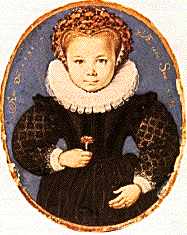Children
This painting, like many of the period*, shows that even in art children were thought of as miniature adults rather than having different needs and desires. Similarly, there was no concept of adolescence*. Parental responsibility -- and authority* -- extended into what we would consider early adulthood.
In noble families, after they had been nursed (not often by the mother) children were usually sent to another noble house to be trained in the decorum of noble behaviour. The effect was rather like sending them to a boarding-school. (Go to the section on the education of children.) Middle and lower-class families usually kept their children at home, but employed them at an early age in business or home duties. Regardless of class, a large number of families in the period were fragmented* because of death and remarriage.
"What, you egg!"
The children portrayed in Shakespeare's plays are without exception precocious--or again simply miniature (slightly naive) adults. Lady MacDuff's son bandies wit with her when she claims that his father is dead, tries to defend her when she is attacked by Macbeth's murderers, and is stabbed by one: "What, you egg!"
Macduff's response to the news of his family's murder is deeply moving; unlike many of Shakespeare's men, he is unashamed of his tears:
Macduff: What, all my pretty chickens and their dam
At one fell swoop?
Malcolm: Dispute it like a man.
Macduff: I shall do so;
But I must also feel it as a man.
(4.3.218-21)
Footnotes
-
Portrayals of children
There are several further examples on this site CD-ROM:
- A woodcut of a family.
- A painting of a family group.
-
No concept of adolescence . . .
. . . though the old shepherd in The Winter's Tale seems to recognize the symptoms of male adolescence--and to propose an antidote:
I would there were no age between ten and three-and-twenty, or that youth would sleep out the rest; for there is nothing in the between but getting wenches with child, wronging the ancientry, stealing, fighting.
(3.3.58-62)
A law of 1563 established the length of apprenticeship as seven years, since "until a man grows unto 23 years, he for the most part, though not always, is wild, without judgement, and not of sufficient experience to govern himself." If puberty started later, it seems that adolescence correspondingly finished later.
-
The role of the parent
Children were expected to obey their parents as subjects were to obey their sovereign. Especially in the gentry and the merchant class, parents were instrumental in arranging their children's marriages, especially those of their daughters. (To be a daughter was to be twice subject: female to male, child to parent.)
However, just as the sovereign had to govern with justice and concern for the welfare of the citizens, parents had to be responsible in the choice of spouse for their children. Thus both practical common sense and religious teaching required that children not be forced into marriages they resisted. Even Kate's father, Baptista, in The Taming of the Shrew, will approve Petruchio's offer of marriage only
. . . when the special thing is well obtained,
That is, her love, for that is all in all.
(2.1.128-29) -
Broken families
Though divorce was virtually unheard of in the period, many, if not most families were "broken" in the sense that one parent had died and the other had remarried, sometimes more than once.
Women frequently died in childbirth; and the child, once born alive, had only a slightly better than even chance to survive to the age of a year old.
